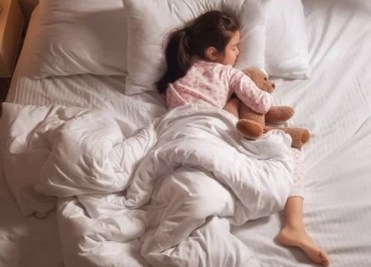Sleep Solutions for Different Age Groups

Getting enough sleep becomes essential for a happy, healthy, and functioning family as parents negotiate the different phases of childhood.
Customised sleep solutions for babies, toddlers, and older kids
A child's growth is fundamentally impacted by sleep, which is essential for mental, emotional, and physical health as well as cognitive development. But creating sound sleep habits might differ greatly depending on the age group, which poses particular difficulties for parents. This post will discuss customised sleep solutions for babies, toddlers, and older kids, offering advice on how to create peaceful evenings and encourage the best possible growth for each age group.
Infants (0-12 months)

Establishing a regular sleep schedule for babies that corresponds with their natural sleep-wake cycles is the main goal. Reduce stimulation and create a peaceful sleeping environment by turning down the lights. Create a relaxing bedtime ritual, like a warm bath or soft music, to let your child know when it's time to shut out the world. To avoid becoming overtired, encourage naps during the day.
Toddlers (1-3 years):

Routine and predictability are highly appealing to toddlers. To help them maintain a regular sleep schedule and wake-up time, establish a regular bedtime. Establishing a nightly routine that include calm activities, lullaby singing, or tale reading is recommended. A comfy bed and little distractions will help you sleep better. To help children move more easily from playing to bedtime, establish a wind-down time.
Preschoolers (3-5 years):

Routines that foster a feeling of security are advantageous for preschoolers. Enable children to select their own pyjamas or bedtime tale, but don't let them determine their own sleep routine. Instead, model bedtime independence. Before going to bed, limit your screen time to prevent overstimulation. By giving assurances and establishing a secure sleeping environment, you can allay any worries or fears.
School-Aged Children (6-12 years):

Children in school frequently have to deal with more social and academic pressures, so getting enough sleep is essential for their wellbeing. Establish a consistent sleep regimen that satisfies your need for rest. Promote relaxing bedtime rituals like reading or light stretching. Reduce noise and make sure your mattress and linens are comfortable to create a sleep-friendly atmosphere. Avoid consuming too much caffeine, particularly in the afternoon and evening.
Teenagers (13-18 years):

Due to hormonal changes and increased academic pressure, adolescents experience considerable alterations in their sleep patterns. Even on weekends, promote a regular sleep routine. Stress the value of relaxing before bed and steering clear of stimulating activities and electronics. Make sure the bedroom has a comfy mattress and enough darkness to promote restful sleep. Encourage stress reduction and relaxation methods to help maintain good sleep hygiene.
Children's sleep patterns need to be established in a dynamic way that changes as they grow. Parents can customise sleep solutions to establish a sleep-friendly atmosphere by being aware of the special needs of newborns, toddlers, and older children. To promote healthy sleep habits that enhance a child's overall development and well-being, it is essential to provide comfort, consistency, and a supportive bedtime routine. Getting enough sleep becomes essential for a happy, healthy, and functioning family as parents negotiate the different phases of childhood.
















